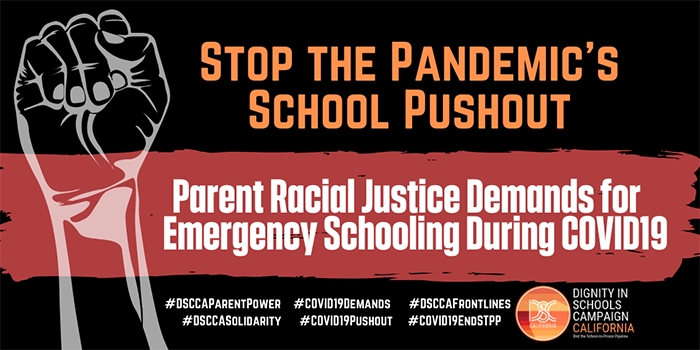
Who We Are
We are the parents, grandparents, foster parents, families and guardians of the children and youth of color whose voices have been missing from schools’ response to this pandemic. We will not have politicians and administrators talking about us or talking over us about what they think our schools need to do.
These are our demands. We expect our school districts and state agencies to read them with urgency and bring back to us their plans for concrete action.
We know what our schools need to do because COVID19 is hitting our communities in a targeted way. We are the “essential workers” on the frontlines–nothing would still be running without us and without our work. We are domestic workers, bus drivers, health care aides, janitors, childcare providers, day laborers, farmworkers, rideshare and instacart delivery drivers. We are these and so much more.
As communities, we are speaking for children and families whom schools won’t hear unless we raise our voices. We are the survivors of a 40-year war against the Black community in the form of mass incarceration, disenfranchisement and joblessness. We are facing now-illegal evictions and water and electricity shut-offs and we are flying under the radar because we are homeless. We are currently incarcerated and on probation or parole. We are undocumented.
Long before the arrival of this virus, we have been fighting to stop our children from being pushed out of school and denied their right to education. The call now rising across the state for “Counselors, Not Cops” began with our organizations over a decade ago. Through Dignity In Schools Campaign California, we dare to imagine and fight for an education system that loves our children the way we do.
Through it all, we have each other’s backs. We are communities standing in solidarity with each other and we will not stand aside and watch our children and families fall through the cracks of this education system. There is more at stake for our children than “falling behind” while schools are closed. Before the pandemic we were already “behind by design,” routed from racially segregated neighborhoods into underfunded and overpoliced schools. Under the pandemic, we are in a fight to stop the death of our children’s education. On top of the policing
and pushout that our children’s bodies have always been subjected to, we are seeing physical punishment and incarceration being extended into a mental and spiritual incarceration through the COVID19 lockdown and isolation.
Emergency Education, the New Pushout and the Lie of “Remote Learning”
We reject all attempts to call what schools are now providing to our children as anything but emergency education. To call it “distance learning” or “remote learning” only hides how completely inadequate and discriminatory it is. From cities to rural areas, while white and wealthier families move ahead, our students and families are left in confusion, waiting and shut out.
School districts remain deeply disconnected from what our students and families need. Whether it’s how to get laptops and high-speed internet access for online classrooms or how to continue IEPs and mental health services during the pandemic, or how to support students who are homeless or in foster care. Schools are scrambling to figure out how to reach our folks. They refuse to meet our communities’ needs.
None of this is news to us. These are the same public school systems that have always pushed out and criminalized our Black, Indigenous, Brown, and LGBTQ students and families. The racialized patterns of death from COVID-19 in our regions, map directly onto the myriad ways our communities are already subjected to poverty, discrimination, and poor health. In the same way, the harms from COVID-19-related school closures fall heaviest on those of us already suffering the brunt of a failing education system.
The pandemic has pulled the mask off of the structural racism and poverty that have always dominated our lives– from education to jobs, from healthcare to housing. And COVID19 exposes the complete failure of this society’s political leadership to address these problems. All of a sudden, our governments are moving to prevent evictions and they are unlocking the gates of their prisons and jails. Why wasn’t this done before? They always told us they couldn’t do these things. And now we know the truth. We will not accept any excuses that our demands are not “realistic.” We demand action.
Demand #1: Redress Civil Rights Harms In Emergency Education Now!
We demand that districts immediately provide additional resources (including compensatory) to student populations who are most impacted by disparities to remedy gaps in our access to emergency education compared to privileged students. Impacted student populations include: Black, Brown and Indigenous students, students with disabilities, English-language learners, homeless and foster youth and their families, and students in alternative education programs (including continuation schools and schooling received by incarcerated youth).
- Equitable access to learning technology and high-speed internet service. Online learning platforms are the primary replacement for in-person teaching and learning. Yet in many majority-of-color districts, as many as 60% of students lack access to computers and internet service that are fast enough to use these platforms.
○ Provide up-to-date computers and high-speed internet service to impacted families who need them without requiring return of equipment.
○ Provide high-touch tech support and trainings to support impacted families to be able to learn how to use the equipment.
○ Provide clean, safe spaces (such as mobile hotspots) for students with barriers to learning in their home environment and for homeless students to engage in emergency learning.
○ Create statewide free high-speed broadband access (see more below). - Comprehensive instructional services and communications with impacted families so that they are able to guide their students’ learning. Includes:
○ training for families and students in how to engage in emergency learning
○ phone-help hotlines for families to support their educational role
○ mandated regular calls from teachers to families to check in on their child’s needs and progress
○ hiring additional educational student aides or family partners to support impacted families. - Culturally relevant emergency education. All emergency learning content must be culturally relevant during this crisis. Also, teachers must receive urgent implicit bias and culturally responsive professional development (training) to address issues arising in emergency education.
- Language equality in emergency education.
○ All emergency education content must be available in the students’ and families’ home language. This is important not only for students who are English learners but also for family members who are not English speakers so that they can fulfill their role as “home school” teacher.
○ Provide interpreters for all communications between school/district staff and families who do not speak English.
○ Restore students’ and families’ access to English-language-learner aides and other educators who work with them. Many students and families have been cut off from aides during the pandemic.
○ The above supports must be provided to deaf and hard-of-hearing students and families. - Provide emergency education modalities other than online learning.
- Ensure special supports for foster (including emancipated youth) & homeless and Indigenous youth and families, who are at elevated risk of falling behind and being pushed out during COVID19.
- No student shall be failed (matriculation) during emergency education and until educational harms have been fully repaired after the emergency.
Demand #2: Remove All SRO’s and Police from Schools; Reinvest Police Budgets Police do not belong in schools.
The presence of police in schools causes racial harms to the well-being of students of color. As schools struggle to support students’ fundamental learning and social emotional needs during COVID19, the continued funding of police for empty school buildings is a travesty. In California, the racial disparities in rates of school-based criminalization are striking: Black students are over 4 times more likely, Native Americans are 2.4 times more likely, and Latinx students are 1.5 times more likely than their white counterparts to be arrested or referred to law enforcement from their schools.1 Now is the time to challenge the historic over-investment in law enforcement. In some of our regions, school-based criminalization is egregious yet the political will does not exist to address the racial harms. In these regions, we draw collective courage from communities and organizations that have demanded that their districts remove police from schools and are actively engaging them to achieve this vision.
We demand that districts publicly release their current budgets for any SROs or school police services being maintained during COVID19 (with detailed budget breakdowns).
- During COVID19, all SRO/police budgets should be redirected and used to provide computers and emergency education support, including computers, high-speed internet service and additional teaching staff and special education staff to support impacted families (see above).
- After COVID19, all SRO/police budgets should be eliminated and the funds released to the schools to determine the best use of these funds for culturally relevant Restorative Justice, Positive Behavior Interventions & Support, Cultural Healing and other community-led programs that address the school-to-prison pipeline.
- Monitoring and community accountability for the above is essential.
Demand #3: Ensure School Families’ Basic Needs Are Met for Food, Housing, Water, Medical Care
Equitable emergency education is a hollow promise if districts and schools will not support impacted school families to have a home environment where learning can happen, a home environment free of hunger and the threats of job loss, eviction, displacement, family separation.
Districts must directly provide:
- “Grab and go” breakfast and lunch for students and groceries for families should be available at all school sites; in rural communities, these should be delivered via school buses.
- Provide free COVID19 testing for all students and school families in our communities (mobile testing in rural communities).
- Provide free, high quality school-based healthcare coverage and access to federal programs regardless of citizenship status.
- Guarantee free childcare for essential workers (e.g. farmworkers) who have children in school.
Districts must sign onto and actively advocate for
- Policy initiatives to stop housing displacement. End all evictions.
- Policy initiatives to stop all ICE enforcement. End all raids, arrests, and deportations.
- Policy initiatives to expand access to unemployment benefits regardless of citizenship/immigration status.
Demand #4: Redress Civil Rights Harms Impacting Students With Disabilities
School districts’ communication and accountability in this area has been shockingly inadequate. IEPs and 504-plans usually require a significant amount of specialized in-person services provided by school staff and educators. Families of students with disabilities are not getting answers for how IEP-required services will continue during the distance learning. Families seeking a new IEP or 504-plan for their child are hitting blank walls. Students with disabilities (on average 10%+ of students), especially students of color, are at extreme risk of falling behind compared to other students if they are not provided their IEP or 504-plan supports.
- Districts must not be allowed to waive the federal requirements of IDEA during COVID19 (as many are now requesting).
- The California Department of Education and state legislature must mandate minimum requirements for all districts to comply with IDEA during COVID19 and create COVID19-specific enforcement and accountability mechanisms.
- Districts must provide intensive summer school for all students with IEPs and 504 Plans.
Demand #5: Restore Access to School Nursing and Mental Health Services
With school buildings closed, students and school families have been cut off from school-based nurses, social workers and school psychologists. They need these educators now more than ever to help them cope with new emergency education systems and the associated stresses of the pandemic.
- Reopen all school-based health clinics and wellness centers as “essential services;” and make telephone and telemedicine appointments available to students, where possible.
- Provide students and parents with remote access (on-line or phone) to school nurses, social workers, and school psychologists.
- Ensure all services are culturally responsive and include access to community-based providers/programs.
Demand #6: Equitable, Transparent School District Governance
When school board meetings and governance processes move online, they exclude impacted school families from participating because of the technology/internet gap.
- Districts must ensure full access for impacted school families who do not have online access to participate in virtual Board meetings.
Demand #7: Massive Post-COVID19 Education Recovery Package
The deficits and harms to impacted students and school families from sustaining emergency education, over months, is beyond calculation.
- After COVID19, every district must have a large-scale, all-hands-on-deck plan for repairing the deficits and harms of emergency education, including needs assessments for impacted students and school families, trauma-related support, support for rebuilding relationships with impacted students and school families, teacher/educator support and additional school staffing.
- Education recovery plans must include universal summer school, with special planning to support all impacted student populations and their families.
- Additional support is necessary for the schools where students were the most behind before COVID19.
- Transparency and accountability for special budgeting during COVID19. With teaching and student services (including transportation, food) drastically reduced, districts should be saving significant funds during emergency education. We demand transparency and accountability to the community over the use of these saved funds.
- Transparency and accountability in the spending of relief funds in education. As relief funds come down from the federal government, we demand transparency and community accountability at every level of decision-making and disbursement of those funds–at the state, district, and school site level. This must include a mechanism for auditing the above spending.
Demand #8: Data Reporting and Monitoring on Racial Harms and Risks Associated with Emergency Education
- During COVID19, school districts and the CDE must regularly track and report disaggregated data regarding disparities in emergency education (disaggregated data on attendance, academic performance, etc).
- School districts must investigate and report health risks and hazards associated with emergency learning, including possible risks from increased exposure to EMFs and phone towers (electromagnetic fields) from computers and wifi.
- Ensure monitoring and accountability for all of the above data reporting.
Demand #9: Statewide Free High-Speed Internet Access (Broadband) and Hotspots
With our communities under government orders to stay at home and maintain social distancing, high-speed internet access is an essential need for accessing emergency education. It is also an essential tool for families to access jobs, health and other services, and for family and social communication/interaction and basic quality of life.
- All students have a right to permanent, universal, free high-speed internet access at home.
- In many regions, internet service providers are offering temporary free access. This should be made permanent.
- Ban on profiteering. Ensure that corporations cannot use any emergency internet access to place people into contracts.
- Ban on exclusion from access for any reason, including exclusion based on negative account history.
Conclusion: Education Reparations
Our demands begin with emergency education but that is not where they end.
What we are demanding represents only a tiny fraction of the educational debt owed to families and students of color stemming from generations of miseducation and school-based criminalization.
Before COVID19, our schools were made to serve as bandaids for structural racism and poverty. They played this role at the same time as they built the school-to-prison pipeline. In our communities, the social safety net has been dismantled piece-by-piece and program-byprogram over the past decades. In response, our schools have tried to become centers for food distribution and social services. They have tried to become health, mental health, dental and vision clinics. But they have never been given the resources they really need to fully repair the
racist history, policies and current practices of public education and of all our social systems. We know that the heart of our fight is to win educational reparations.
Across the country, our movements are demanding Medicare for All, Guaranteed Income, Universal Unemployment Support, Worker Protections, and Guaranteed Affordable Housing. We join these and all demands for immediate protections from eviction and foreclosure and the release of our family members incarcerated in jails, prisons, and detention centers.
We are committed to transforming our communities and schools. We are organizing and standing in unity with all those who are in struggle and resisting.
About DSC CA The purpose of the Dignity In Schools Campaign California (DSC CA) is to deepen grassroots community-based understanding of the historical role and future implications of school discipline, the relationship between schools & law enforcement, and the dehumanizing impact of the public education system and expand our movement’s political opportunities to dismantle the school-to-prison pipeline, repair the intergenerational harm it has caused, and craft systemic alternatives for multiple generations.
For more information, go to: https://dignityinschools-ca.
CLICK HERE to download PDF of the letter of information in English, CLICK HERE to download PDF of the letter of information in Spanish.
——————————————-
1 Analysis of OCR’s Civil Rights Data Collection, 2016-2016.




